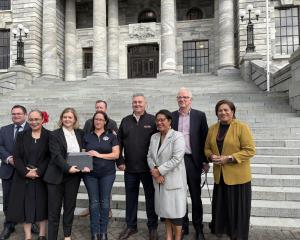
On the sixth stop of his open health forum, Associate Minister of Health Matt Doocey heard from worried GPs, medical trusts, midwives and aged care providers about problems facing healthcare in Southland.
Also on the panel were Southern District Health Board general manager Simon Donlevy, Ministry of Health Associate deputy director-general Steve Barnes and Ministry of Health clinical chief adviser rural Helen Connole.
Seated next to the minister was Te Whatu Ora Health New Zealand Te Waipounamu community integration group manager Aroha Metcalf.
Hauora Taiwhenua Rural Health Network chief executive Dr Grant Davidson emceed.
Dr Debra Wilson of Gore Medical Centre started with a call to train more GPs, suggesting incentives for those training in rural areas — such as subsidised accommodation.
Minister Doocey said part of the answer was "opening up the funnel" and widening admissions at Otago and Auckland medical schools.
But, he said, opening more places did not guarantee students would become GPs.
That was why the Ministry of Health had proposed a third medical school in Waikato, focused on primary care and rurality, he said.
Then, Northern Southland Medical Trust chairman John Douglas lamented the loss of the Lumsden Maternity Clinic in 2019 and the problems it had opened up for rural mums.
"When that shut down, it has created considerable anxiety in our community, with mothers having to travel huge distances to give birth," Mr Douglas said.
He said when the clinic was operating they had low rates of post-natal depression and other good outcomes for mothers and babies.
Ms Metcalf responded acknowledging that in Southern, the model of maternity care was not consistent across urban and rural communities.
Without promising anything, she said she would be interested in looking at the fallout of the closure six years on.
Minister Doocey identified the stress of needing to travel in rural healthcare labelling it one of his priorities.
Gore midwife Tash Baillie pointed to a lack of beds and understaffing, the problem for her was that Southland Hospital was taking their midwives when Gore needed them.
Ms Metcalf responded saying one good thing about being new to her role with Southern HNZ was that she was looking at everything with fresh eyes.
"When I started to work here in Southern, I'm like, holy heck, how did that happen? Because there are just a mishmash of ... bespoke things, and patchwork, and band-aiding," she said.
She said many rural health services had operated on the smell of an oily rag for a long time and nonsensical problems needed to be fixed.












